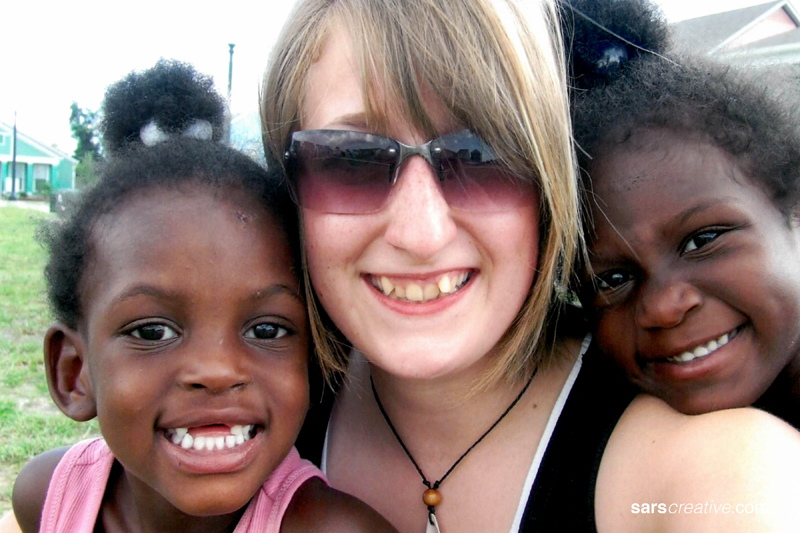Originally posted at SheLoves Magazine.
I never understood my privilege until I moved to New Orleans when I was 21.
I moved because I had hands that worked and I wanted to do something good after Hurricane Katrina tore through the city. And I’m still not sure if I made much of an impact on the city, but it definitely made an impact on me.
Over fried chicken and sweet tea I began to see that my world, as I had always known it, was very narrow—I constructed my world of people quite similar to myself, with common heritage, background, religion and … ugh, here it comes … ethnicity. With the exception of a couple boys from my church and a few college roommates, my world was west coast, North American, middle-class and oh so white.
And as my eyes opened, I got flipped on my head by a not-so-subtle-11-year-old with a sassy smile and meticulous cornrows.
“You need braces,” she announced to me.
I grinned my pointy snaggle teeth back at her. “I know.”
“Why don’t you have none?” she demanded.
“I could never afford them.”
She eyed me suspiciously. “But you white.”
I chuckled. “Yes, but that doesn’t mean I have money.”
She wasn’t buying it.
“How ‘bout your momma?”
“I don’t live with my mom and she doesn’t have money for braces,” I assured her.
“But you white.”
“Yes, I think we established that part,” I tried to joke.
“Where’s your car at?” She prodded.
I pointed to a beat up grey sedan with a mismatched trunk lid.
“That. Is. Your. Car?”
I nodded.
“But you white.”
I nodded again.
She rolled her eyes.
“Where you live?”
“Just down the street,” I told her.
“You live on Whitney?!”
I nodded. “Yes, on Whitney.”
“But you white,” she reminded me, lest I forget.
I half-smiled and put her little hand into my palm and stared her right in the eyes. I wanted to tell her the world was made for her as much as for me. I want to tell her it was as much for her as for the white, male politicians who decided school districts and commercial zoning in her neighborhood. I wanted to tell her to adventure as far as she dared and then push herself to go further. I wanted to say a hundred things at once, but the words just didn’t fit right.
Instead I said, “I’m sorry.”
She just scrunched up her face and told me again that I should get braces. Then she trotted off, leaving me with too many feelings and not enough hope.
There were so many moments in the Fischer Housing Projects that reminded me that I was born lucky—privileged—because of an old screwed up system that hangs on like red onions even after we’ve brushed our teeth a hundred times over.
The first thing I learned was that I was not a volunteer on the playground of the projects. I was a student. My job was not to fix things. My job was to learn. My job was to listen. Take note. Grow. And then be better.
The assumptions the kids made about me because I was a white girl, were both hilarious and heart-breaking.
And that’s where I found the keyword—assumption. It wasn’t that the kids were even wrong. It’s that they assumed I could get things in the world that they might not. And the injustice of a child feeling held down for any reason really pissed me off.
My childhood wasn’t all sunshine and unicorns. It was dark at times. Many times. But I still left the place I grew up and assumed that I could make it in the world doing anything I damn-well-pleased. I assumed I’d go off to university after high school, even though nobody had gone to university before me. I assumed I would travel the world, even though nobody had made a habit of traveling. I assumed I could be anyone I wanted to be.
That New Orleans playground humbled me. It asked me what I was made of and expected me to prove it.
Prove it.
That playground with those sassy girls and boys reminded me that I’m a storyteller. When I left New Orleans and Whitney Avenue, I wanted to learn to be a reporter.
But it turns out I’m not the kind of journalist with perfect AP style and punchy headlines.I’m not the kind that can stay unbiased while you serve me fried ocre and show me photos of your grandbabies. I’m the kind that will nestle into your salty, tear-stained cheeks. I’m the kind that wants to know the value of a rich language passed down from days almost forgotten.
Because the only language I know is “California” English—you know, the kind in movies and national news broadcasts. We’d call it UNaccented English (which I realize now is completely unfair). But New Orleans has its own set of language rules and I learned that my job wasn’t to “fix” the grammar. My job was to soak it up.
My job was to slow down a little and let the grocery clerk call me “Sugar” and the neighbors call me “Baby.”
My job in New Orleans wasn’t to help rebuild the city. It was to ask the city to help rebuild me.

Leave a Reply